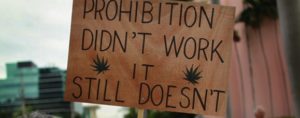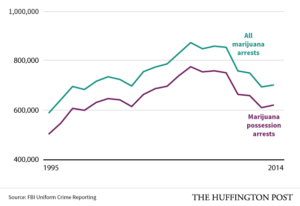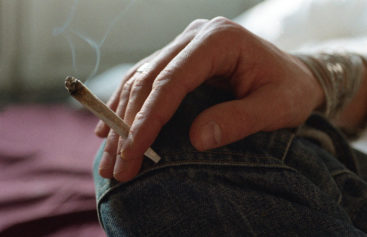

To understand the war on drugs, it is necessary to understand marijuana. Last year, 44.9 percent of drug arrests in the U.S. were for weed, with pot possession accounting for 39.7 percent of all drug arrests and over 5.5 percent of all arrests in the nation. Nine out of ten of the individuals arrested were not violent and had no felony background. This comes as real crimes are being committed, as FBI data shows that more than a third of murders in 2014 were unsolved.
Meanwhile, as America spends $3.6 billion each year on enforcement of marijuana possession laws, according to the ACLU, countless lives are ruined in terms of jail and prison time, even life sentences, financial hardship, and lost jobs and license revocations. More states will consider marijuana legalization in 2016, including Arizona, California, Massachusetts, Missouri and Nevada. A majority of Americans favor legalization and 30 million people use marijuana.

The war on marijuana is a war on Black people, as the racial disparities are clear. Although Blacks and whites use weed at the same rates, Blacks are 3.7 times more likely to be arrested for possession than whites, according to a report from the ACLU. Moreover, Black people are more likely to be arrested for marijuana offenses in every state except Hawaii. The worst state is Iowa, where Blacks are 8.3 times more likely to be arrested than whites.
As Maia Szalavitz reported in The Fix last year, most of what people believe about marijuana is the result of racist, unscientific and paranoid government propaganda. When marijuana prohibition went into effect in 1937, the opposition of the American Medical Association to the policy was ignored. Rather, racism drove the efforts to criminalize weed. Harry Anslinger, the first commissioner of the Federal Bureau of Narcotics (a predecessor of the DEA), a leader in marijuana prohibition, made raw appeals to racism. For example, he said “Reefer makes darkies think they’re as good as white men,” and the main reason for prohibition was “its effect on the degenerate races.” Anslinger did not mince words, adding:
There are 100,000 total marijuana smokers in the U.S., and most are Negroes, Hispanics, Filipinos and entertainers. Their Satanic music, jazz and swing result from marijuana use. This marijuana causes white women to seek sexual relations with Negroes, entertainers and any others.
And the racism underlying marijuana policy in America is still being felt today. This is why a person, usually Black, is arrested for weed possession every 51 seconds.

